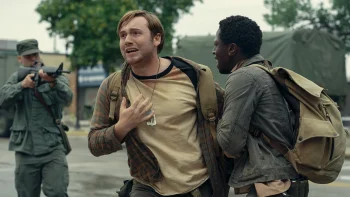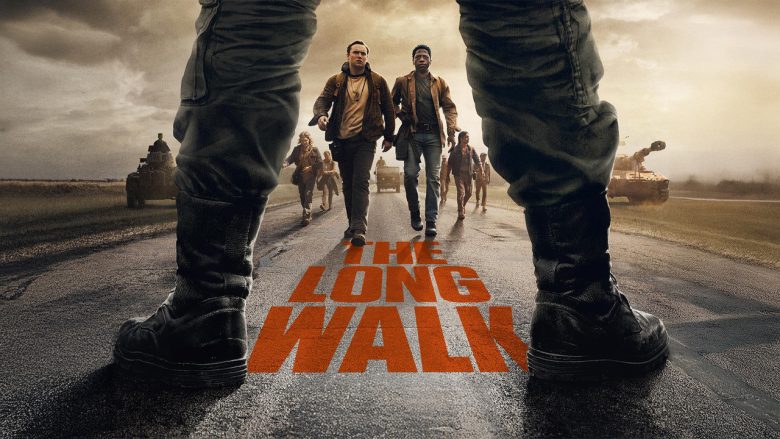The Long Walk
Review by Maureen McCabe
Stephen King was seemingly born with an astonishing prescience that somehow allowed him to predict and movingly describe the devastation to be wreaked by dire events of the 21st century decades before they happened. 1978’s The Stand was an eerie foreshadowing of the Covid pandemic, and The Long Walk, although written in the shadow of, and in response to, the Vietnam War, is amazingly relevant today as the world lurches towards authoritarianism. Written back in 1965-66 when King was a freshman at the University of Maine, The Long Walk was the first book King penned. It was published in 1975 under King’s pseudonym of Richard Bachman and now after 46 years has finally been made into a film. The journey to get the film made was long and convoluted, with King associates George A. Romero and Frank Darabont at different times connected to it before it ended up in the hands of that master of teenage dystopia Francis Lawrence (The Hunger Games.) Director Lawrence and screenwriter JT Moliner, along with King, have teamed up to create a gritty, gory, but surprisingly moving, adaption.

One of the reasons it took so long for the film to be made is that the book is quite grim, despite lacking a typical horror-story villain. The premise is that in a poverty-ridden United States ruled by a totalitarian military regime, an annual contest is held to raise morale and counteract an “epidemic of laziness” that has occurred as a result of a horrific war some years in the past. Fifty teenage boys, selected by lottery, embark on a marathon with no finish line, no bathroom breaks and no rest periods. The boys are followed by armed men in jeeps and must maintain a pace of three miles an hour. If they drop below the designated speed, they receive a warning. Three warnings and they are killed. The last boy walking wins a cash prize and gets one wish granted.
The film does not sanitize the harrowing plot. The boys are killed in gruesome closeups, and the grosser aspects of the walk are filmed realistically. But despite the brutality and despair permeating the walk, there are moments of laughter and friendship, as the boys help each other and forge connections with unlikely allies despite their own suffering. That the film contains such heart is a testimony to the genuine humanity that is a trademark of King’s work, and to the excellent acting of the mostly young cast. Judy Greer is heart wrenching as a grief-stricken mother, and an unrecognizable Mark Hamill is utterly convincing as the menacing military leader known only as The Major. But it is the youthful actors playing the boys who give the film its soul. With that many boys it’s impossible to learn the backstory of each one, and even most of the ones that are highlighted are sketched very briefly. But the young actors give their characters a desperate vulnerability and youthful likeability. Cooper Hoffman as Ray and David Jonsson, as Pete, the two main characters, turn in soulful, aching performances that keep the audience deeply invested in their outcomes.

Unlike The Hunger Games, which showcases fully developed and intricate world- building, The Long Walk is purposefully vague about many things. We’re not really sure of the logistics of the lottery that chooses the boys, or how or why the entire country seems so utterly hopeless that sending your young son off to compete in a grueling race that most likely will end with his death seems like the only means to escape grinding poverty. The movie is set in the future, but looks like it could take place today, or fifty years ago, or in in the middle of the Great Depression. In many ways, this very vagueness adds to the menacing atmosphere. The attitude seems to be, there’s no real explanation for all this bleakness, and therefore no way to change it, although Gus and Pete have their own wildly different ideas about what to do about that.
By the time the film reaches its painful and somewhat ambiguous conclusion, the viewer will most likely find themself feeling as if they too have been on a grueling journey. Brutal, bloody, but oddly beautiful, The Long Walk is worth the trek.
Maureen McCabe is a native Southern Californian who enjoys mysteries and thrillers, despite being easily scared.







